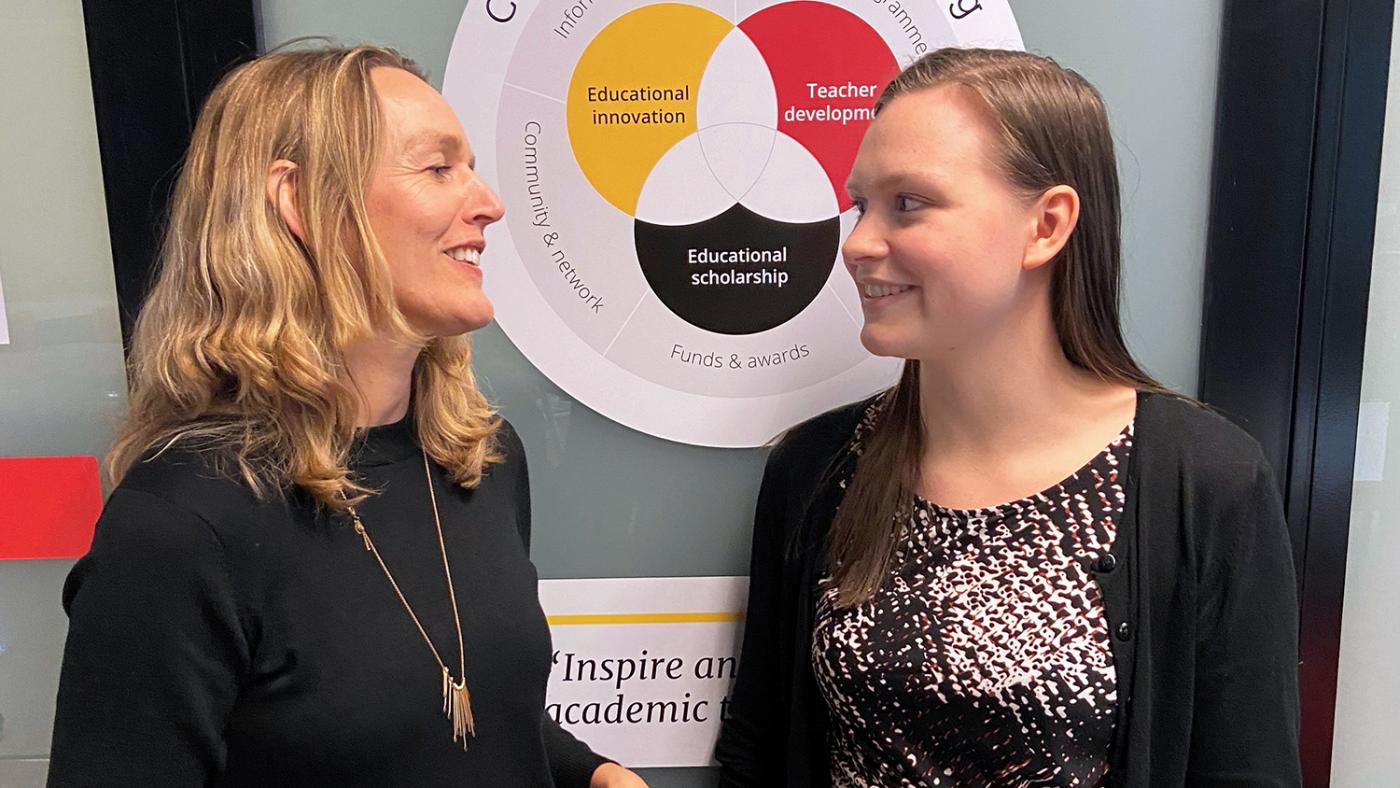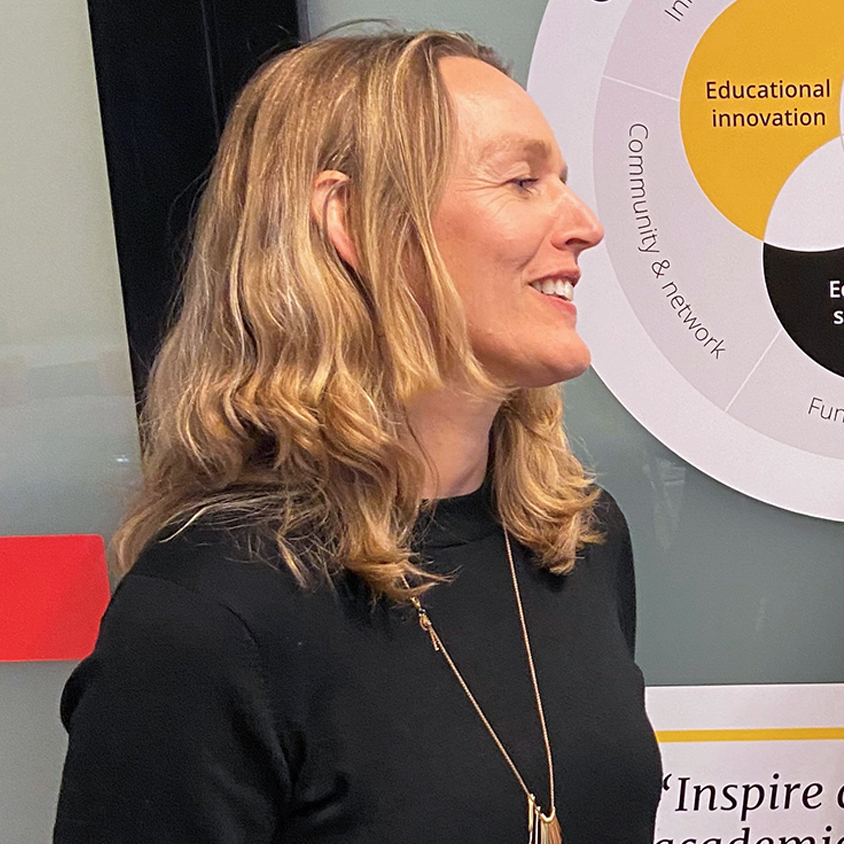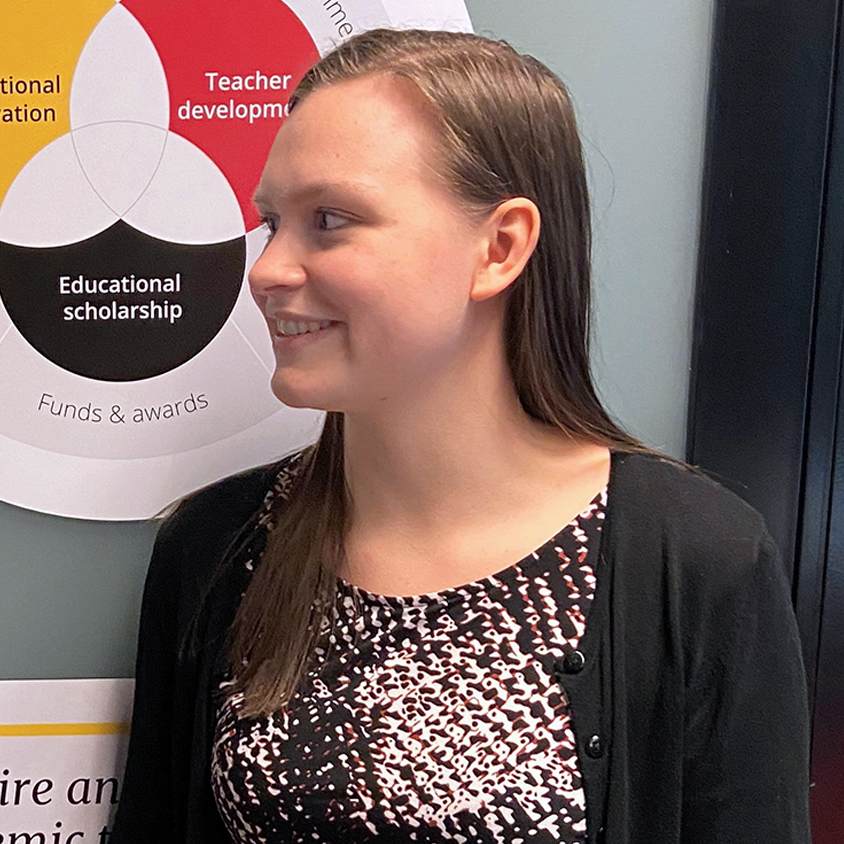How can academic teachers improve themselves?

The interest ‘old dog’ Manon Kluijtmans (50) has in quality of education dates back to her days as a student at the UU. Armed with sleeping bags, mats, and forage, she and many of her fellow students invaded the Trans I building (now: Marinus Ruppert building) in De Uithof in the late 1980s. The protesting students are dissatisfied with the meagre quality of the education they’ve been given at the university. “We played Risk all night,” Kluijtmans says. At the time, the protest felt mostly scary and exciting, but it actually did have some positive consequences, she says. Since then, Kluijtmans has become professor at the faculty of Medicine. Her assignment is to use education to build a bridge between practice and science. She’s also vice rector of Teaching & Learning, and she’s scientific director of the Centre for Academic Teaching.
Pioneer
Kluijtmans says that until the 1990s, barely any attention within academia was paid to the professional development of academic teachers. Utrecht was the first university in the Netherlands to decide to start working on this seriously, introducing the basic and senior teaching qualifications (bko and sko). Nationwide, other institutions quickly followed the UU’s example. Since then, many other steps have been taken, such as the introduction of the Utrecht Stimulation Fund Education, and the Educate-it programme. In 2017, the UU established the Centre for Academic Teaching. This is a UU-wide network organisation, of which Kluijtmans is director, next to her regular position as a professor. “Teachers at Utrecht University can use the centre for information, sharing knowledge, support, and training, all focused on their own development and the innovation of their education,” Kluijtmans explains enthusiastically.
Professional development of academic teachers has now once more become a relevant topic, thanks to the national discussion of ‘recognition and reward’, order to restore balance to the assessment of research, education, and societal impact. An important element in this discussion is the answer to the question of what an academic teacher’s work actually consists of, and in which way a teacher can ensure their education connects with scientific and societal developments. The work Manon Kluijtmans and ‘young blood’ Esther van Dijk (25) provides insight into these questions.
Esther joins the conversation. The PhD candidate comes straight from a presentation she gave to her colleagues about her current research on expertise development of academic teachers. She’s roughly halfway in her PhD track that she started in early 2018, with supervision from Manon as well as from Jan van Tartwijk and Marieke van der Schaaf. Aside from theoretical insights, her research aims to provide practical tools for the evaluation and support of academic teachers – something academia is waiting for to be able to implement the current policies, Kluijtmans says.
“In the sense of collaborating with Manon, I knew what I was getting into,” says Esther van Dijk. “After my graduation (Manon supervised Esther’s Master’s thesis in Educational Sciences, ed.), we kept in touch to co-publish my thesis. At the time, I’d never considered doing a PhD track, but Manon encouraged me to. And then I found the vacancy for this project; the content appealed to me, and I applied.” For her PhD research, she spent the first three months in endless conversations about her research topic with scientists, advisors, and teachers, and she read piles upon piles of literature. The start-up phase consisted of a lot of figuring stuff out, because: what does the term ‘expertise development of academic teachers’ actually mean? Once she had that clear, she could get to work
Quality of teachers
One of the questions Manon focuses on as an administrator, is how you should evaluate the quality of teachers. “How should teachers develop, and how do you measure that? At the moment, we mainly look at student evaluations, but that doesn’t give you a full picture. Moreover, there’s more and more evidence that shows the student satisfaction grade is very biased; for instance, men are structurally evaluated higher than women.” The level of satisfaction is also at times in contrast with how much students learn. “Imagine that you’re a teacher of a very mediocre group of students. It doesn’t matter how amazing your classes are; students’ grades are not going to reflect your awesomeness,” Esther says. “So although of course, student evaluations are important as input on how students experience education, and they can be used to improve courses, it doesn’t say a lot about teaching.”
The fundamental academic question of what teacher expertise entails is the basis of Esther’s PhD research. With her supervisors, she identified the frameworks that are used throughout the world to express what an academic teacher should be capable of. “We analysed, from a task-oriented perspective, what academic teachers are supposed to be capable of,” Esther explains. Manon adds: we encoded all descriptions from those 46 frameworks, threw them in a pot, and then looked at which task areas became individually visible – the common thread throughout all those frameworks.
Six task areas
The analysis shows that worldwide, roughly six task areas can be described for teachers: teaching and supporting learning; educational design; assessment and feedback; educational leadership and management; educational research and scholarship; and professional development. Esther takes a sheet from her bag that she’d just used in her presentation. “Look, within these task areas, teachers can develop themselves by improving in a certain (sub)task, by learning new (sub)tasks, and by expanding their influence in a certain (sub)task. This model doesn’t only provide a consensus of all existing frameworks, but also provides new insight into how teachers can develop their expertise.”
Educational leadership
Esther is now building on this analysis of existing frameworks. It’s the first part of her thesis. In the two years or so that she has left, she will dive into the subject of how teachers develop expertise in different task areas, and the connections between expertise in different task areas. One of the follow-up studies is a retrospective study, in which senior academic teachers reflect on the six task areas she’s described. That will help Esther to further understand the development of teachers.
One of the questions Esther thinks is the foundation of this is the following: is expertise throughout the six task areas connected? Is, for instance, educational leadership a different expertise than offering high quality education? As teacher, you should know what type of expertise you need. “I spoke with a teacher who said that he’d become a member of the programme committee, and had taken the role of president. He’d since gained the insight that that didn’t suit him at all. That doesn’t mean he’s not a good teacher. It does show that expertise in one task area is different from that in another.”
Both within Utrecht University and beyond, there’s a lot of interest in the synthesis from the first part of Esther’s research. “I’ve already shared some of the results, and they’re being used in policy support. And although it’s great that results are already being used, it’s certainly creating some tension for my publication,” Esther thinks. She’s not entirely sure what parts of a study you are and aren’t allowed to share before publishing an article in an academic journal, and that’s tricky. What will they accept, and what won’t they? Her supervisors help her make decisions in this, because that too is a part of the learning process in a PhD track. “It’s remarkable for us as well that universities are so eager to see these results; it’s not something you find often in research. It’s clear we’re at a turning point here. Good education and better evaluation of teaching are important to universities, just like a teacher’s societal role,” Manon says.
 |  |
| Manon about Esther: “What I value in Esther is her cleverness. She loves figuring things out completely. She won’t just read one single article to understand a concept or a term, but she’ll read anything that’s relevant. That deep interest is very academic, and it’s a fundamental characteristic of a PhD candidate. Her networking capacity is also great. She’s also good at giving her theoretical results a practical application. Her project management and planning skills come in handy here. She works hard, she’s goal-oriented and flexible. She knows so well what has to be done. I only have one piece of advice, really, and that’s about the fact that she likes so many things: she has to prioritise. Esther likes teaching students, for instance, and it adds to both her insight into this study and her own development. So that’s great, but we should always monitor the volume of this, because she also wants to get her research done in time. She also likes to give presentations and workshops. In all those choices, it’s important to keep wondering what gives you energy, and what has priority. That’s also an important skill for the future.” | Esther about Manon: “I value Manon’s enormous drive and ambition to take education a step further. I got to know her better in this when I did an elaborate interview with her about her career, as pilot for my study. With every step she took, she consciously wondered whether it would bring her something new. Our collaboration is very inspiring, because Manon follows her own heart and interests a lot in this. For example, after her biomedical PhD, she went to Peru to do development work, then studied to become an epidemiologist, and finally specialised in education. Manon is also very warm and involved with her colleagues, and that’s really important to me. She also pays attention to how I’m doing, and that helps me to function optimally. One thing Manon always tells me, is something she herself could also apply more to her own life: say no more often. Her schedule is always full within seconds, so like me, she also has to make choices constantly.” |